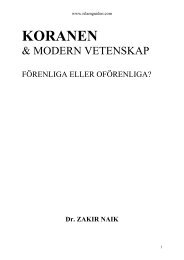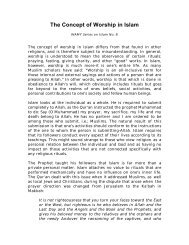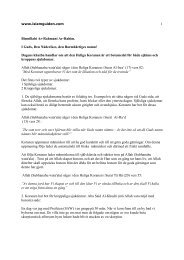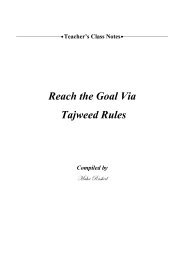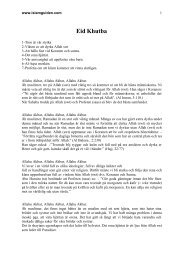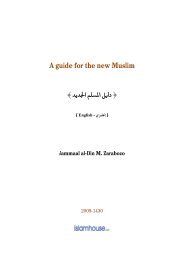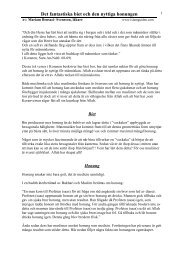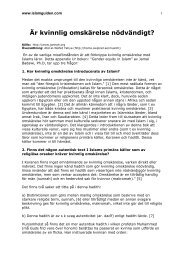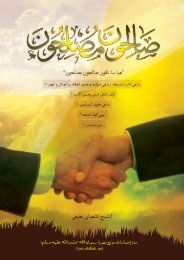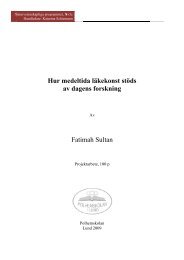The Prophet's Prayer From The beginning To The End As Though ...
The Prophet's Prayer From The beginning To The End As Though ...
The Prophet's Prayer From The beginning To The End As Though ...
Create successful ePaper yourself
Turn your PDF publications into a flip-book with our unique Google optimized e-Paper software.
[51]Even against their fathers and learned men, as Tahaawi in Sharh Ma'aani al-Aathaar (1/372) & Abu Ya'laa in his Musnad<br />
(3/1317) have related, with an isnaad of trustworthy men, from Saalim ibn 'Abdullaah ibn 'Umar, who said:<br />
"I was sitting with Ibn 'Umar (radi Allaahu 'anhu) in the mosque once, when a man from the people of Syria came to him and asked<br />
him about continuing the 'Umrah onto the Hajj (known as Hajj Tamattu'). Ibn 'Umar replied, 'It is a good and beautiful thing.' <strong>The</strong><br />
man said, 'But your father (i.e. 'Umar ibn al-Khattaab) used to forbid it!' So he said, 'Woe to you! If my father used to forbid<br />
something which the Messenger of Allaah (sallallaahu 'alaihi wa sallam) practised and commanded, would you accept my father's<br />
view, or the order of the Messenger of Allaah (sallallaahu 'alaihi wa sallam) ' He replied, '<strong>The</strong> order of the Messenger of Allaah<br />
(sallallaahu 'alaihi wa sallam).' He said, 'So go away from me.' Ahmad (no. 5700) related similarly, as did Tirmidhi (2/82) and<br />
declared it saheeh.<br />
Also, Ibn '<strong>As</strong>aakir (7/51/1) related from Ibn Abi Dhi'b, who said:<br />
"Sa'd ibn Ibraaheem (i.e. the son of 'Abdur Rahmaan ibn 'Awf) passed judgment on a man on the basis of the opinion of Rabee'ah<br />
ibn Abu 'Abdur Rahmaan, so I informed him of the saying of the Messenger of Allaah (sallallaahu 'alaihi wa sallam) which was<br />
contradictory to the judgment. Sa'd said to Rabee'ah, 'We have Ibn Abi Dhi'b, whom I regard to be reliable, narrating from the<br />
Prophet (sallallaahu 'alaihi wa sallam) contrary to what I ruled.' Rabee'ah said to him, 'You have made your effort, and your<br />
judgment has been passed.' Sa'd said, 'Most amazing! I enforce the decree of Sa'd, and not the decree of the Messenger of Allaah<br />
(sallallaahu 'alaihi wa sallam)! No, I shall withdraw the decree of Sa'd, son of the mother of Sa'd, and enforce the decree of the<br />
Messenger of Allaah (sallallaahu 'alaihi wa sallam).' So Sa'd called for the written decree, tore it up and gave a new verdict."<br />
[52]In fact, he would be rewarded, because of the <strong>Prophet's</strong> saying (sallallaahu 'alaihi wa sallam): "When a judge passes<br />
judgment, if he makes his effort (ijtihaad) and rules correctly, he will have two rewards; if he makes his effort<br />
(ijtihaad) and rules wrongly, he will have one reward." (Related by Bukhaari, Muslim & others.)<br />
[53]Quoted in the notes on Eeqaaz al-Himam (p. 93)<br />
[54]Fulaani (p. 99)<br />
[55]cf. al-Waaqi'ah 56:13-14<br />
[56]Ibn 'Aabideen in Haashiyah (1/62), & Lucknowi gave its source in an-Naafi' al-Kabeer (p. 93) as Ghazaali .<br />
[57]He himself says at the <strong>beginning</strong> of his Concise Shaafi'i Fiqh (printed in the margin of Imaam Shaafi'i's Al-Umm):<br />
"This book is a selection from the knowledge of Muhammad ibn Idrees al-Shaafi'i (rahimahullaah) and from the meanings of his<br />
sayings, to aid the understanding of whoever wants it, knowing of his forbidding the following of his, or anyone else's, opinion, so<br />
that such a person may carefully look for his Deen in it."<br />
[58]In which he has explained his opposing his Imaam in about twenty masaa'il (nos. 42, 44, 103, 120, 158, 169, 172, 173, 228,<br />
230, 240, 244, 274, 275, 284, 314, 331, 338, 355, 356 - from Ta'leeq al-Mumajjid 'alaa Muwatta' Muhammad (Important Notes on<br />
Muhammad's Muwatta'))<br />
[59]Ibn 'Aabideen mentioned him among them in Haashiyah (1/74) & in Rasm al-Mufti (1/17). Qurashi mentioned him in Al-<br />
Jawaahir al-Madiyyah fi Tabaqaat al-Hanafiyyah (p. 347) and said, "He was a reliable transmitter of Hadeeth. He and his brother<br />
Ibraaheem were the two shaikhs of Balakh of their time."<br />
[60]Al-Fawaa'id al-Bahiyyah fi Taraajum al-Hanafiyyah (p. 116)<br />
[61]Al-Bahr ar-Raa'iq (6/93) & Rasm al-Mufti (1/28).<br />
[62]Al-Fawaa'id ... (p. 116); the author then added a useful note:<br />
"<strong>From</strong> this can be deduced the falsity of Makhool's narration from Abu Haneefah: 'that he who raises his hands during <strong>Prayer</strong>, his<br />
<strong>Prayer</strong> is ruined', by which Ameer, the scribe of Itqaani, was deceived, as has been mentioned under his biography. 'Isaam ibn<br />
Yoosuf, a companion of Abu Yoosuf, used to raise his hands, so if the above-mentioned narration had any foundation, Abu Yoosuf<br />
and 'Isaam would have known about it ... It can also be deduced that if a Hanafi ignored the madhhab of his Imaam in an issue due<br />
to the strength of the evidence against it, this would not take him outside the ranks of the Imaam's followers, but this would in fact<br />
be proper taqleed in the guise of leaving taqleed; do you not see that 'Isaam ibn Yoosuf left Abu Haneefah's madhhab of not raising<br />
the hands, but he is stil counted as a Hanafi... <strong>To</strong> Allaah I complain of the ignorance of our time, when they insult anyone who does<br />
not follow his Imaam in an issue because of the strength of evidence against it, and expel him from the fold of that Imaam's<br />
followers! This is not surprising when those who do this are from the ordinary masses, but it is amazing when it comes from those<br />
who imitate men of learning but plod along that path like cattle!"<br />
[63]an-Noor 24:51-52<br />
٦٧



